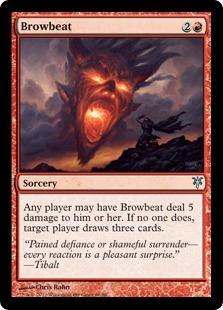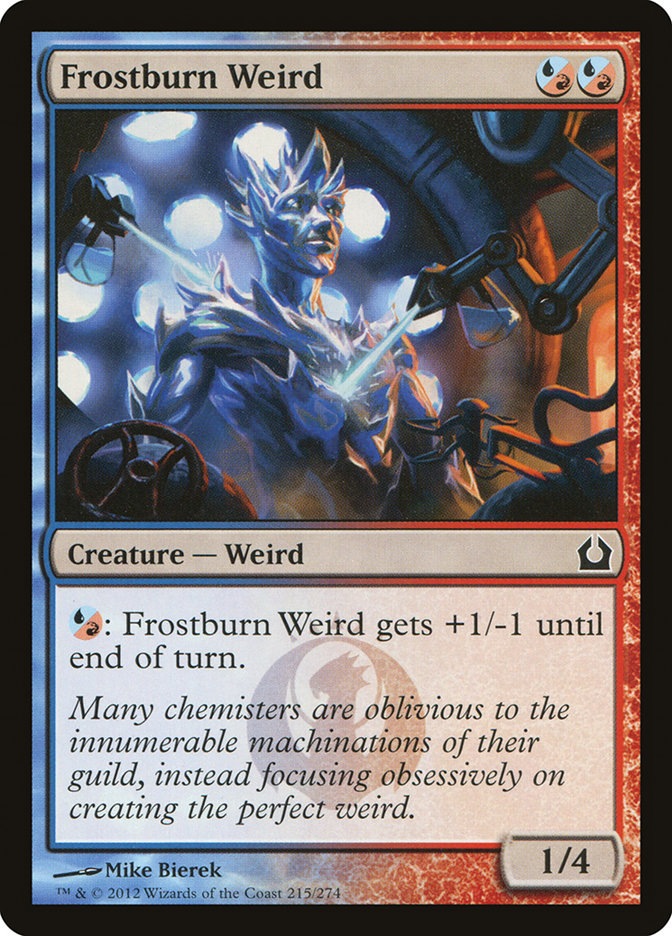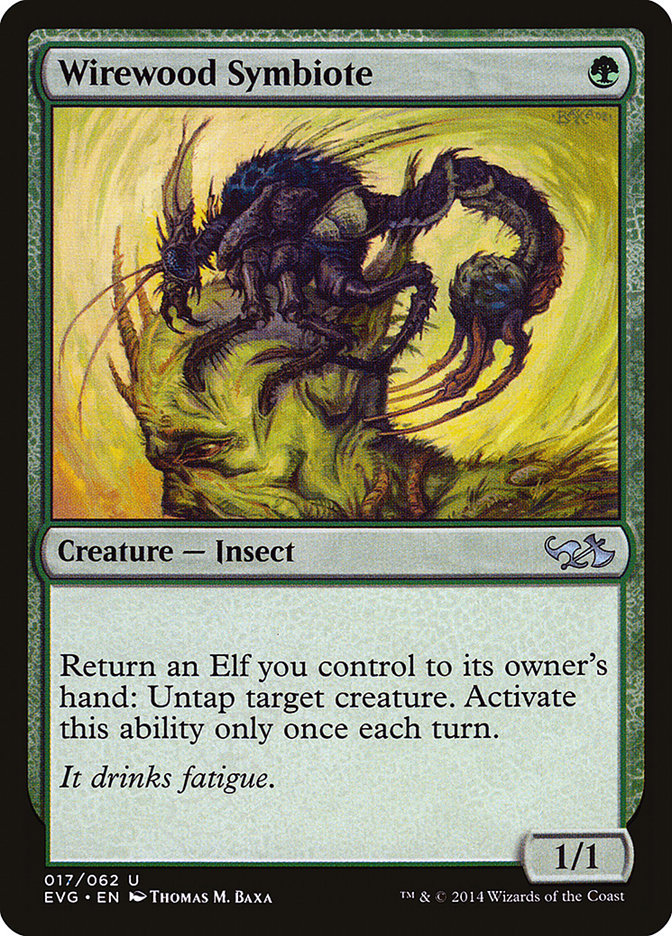Welcome to my first article as a regular columnist for Starcitygames.com! My articles will be published biweekly on Wednesdays, and I am both excited and
humbled to join an excellent staff. I have read Premium content on this website for so many years that seeing my name up here on a regular basis is going
to be strange at first, but I think I will warm up to it pretty quickly.
When brainstorming for this opening column, I was torn about how I could give you something relevant while avoiding common cliches that too often plague
Magic articles. This of course led me to examine why those cliches exist in the first place. Why are writers compelled to append a brief summary of their
Magic history to the beginning of a seemingly unrelated article? It seems obvious, but the answer to this question is quite simply: where you come from is
incredibly important! My history with the game has shaped my perspective in a completely unique way. It has given me a particular set of strengths,
weaknesses, and biases and understanding what these are is paramount to evaluating my opinions and leveraging these articles for your own benefit. If this
is so important, why not expand that pithy opener into an entire piece? This article will not contain much strategy content, but rather is going to be as
honest a self-evaluation as I can muster, and I hope you keep what I have written here in mind while reading future columns.
To begin, I am not a natural talent. I have spent the majority of my Magic career in obscurity, falling prey to nearly every pitfall of newly competitive
players. I was the kid who looked at Browbeat and said “Five damage or three cards for three mana! How could I lose?” I went one step further by casting
Burning Wish for Book Burning in my sweet R/B Magnivore deck. Fortunately, U/G Madness was a tier one deck that cost about thirty dollars or I would have
never won a match. Even I could see that discarding two Basking Rootwallas to your turn 1 Careful Study was a good play. Now I am particularly wary of easy
ways to be led astray, whether it be overvaluing a flashy effect or overreacting to a specific threat in sideboarding. I will certainly look to highlight
specific instances where these traps are easy to fall into during future articles.
After improving at my local FNM every week, I essentially plateau-ed as an average PTQ player. I knew my way around the cards, but my approach to the game
lacked any context. Magic to me was about figuring out which cards were good and drawing them at the right time. I would look at decklists and immediately
dismiss the bad cards without having thought about how they could fill a necessary role. Needless to say, this hopelessly myopic perspective limited me to
occasional good finishes with a bounty of 2-2s alongside them. I thought I was improving as my ability to categorize cards into “good” and “bad” improved,
but in reality I was the same player for years. Context is vitally important to every decision in Magic, from card evaluations to metagaming. It is the
entire purpose of this article; who I am as a player is the context in which my opinions should be evaluated.
Ironically, it was a time when I played the least when I made the most salient improvement in my game: college. That is because my primary issues were not
solvable by grinding test games. These issues were in my approach and attitude. First and foremost, I lacked the humility to see my mistakes. Like many
Magic players, I breezed through high school and liked to view myself as the smartest guy in the room. It took about three classes at Harvey Mudd College
for that illusion to shatter. I learned to ask for help when needed and accepted that I had to work hard to improve or fall well behind my peers. Rather
than reacting to my struggles with arrogant frustration, I valued the opportunity to overcome an obstacle. In doing so, results were far less important
than the process which is a mantra that applies especially well to Magic. We play a fickle game, and some days you can make all the right decisions and
still come out on the wrong end of things. It is vital to evaluate your progress irrespective of your results. If you play your best, the results will
eventually follow.
In addition to vast improvements in my attitude, I now understand how my education directly improved my play. My background is in mathematics, and with
that came plenty of opportunity to develop analytical thinking skills with a sharp focus on figuring out what information is significant and what is
extraneous. As such, I find that I now excel in playing on-board Magic where role assessment is important which has led to most of my success coming with
non-linear, proactive strategies. I want to pressure my opponent and limit their options while simultaneously leaving myself flexible. To quote Brian
Kibler: “Options win games.”
These types of decks are typically creature-oriented as I also enjoy wading through the possibilities of combat and optimizing the speed of a race to win
by a turn or figuring out when to turn the corner and transform defense into offense. The Mono-Blue Devotion deck plays a lot of these games using
Frostburn Weird, Thassa, God of the Sea, and Nightveil Specter in both defensive and aggressive roles. Also, cards like Thassa and Master of Waves are
exactly the kind of powerful, immediately impactful threats that aggressive decks need to come back if they fall behind early. My previous success in
Standard on the Open Series came with U/W Delver, which used Geist of Saint Traft and Restoration Angel in the same role. While Geist does not have the
same direct defensive impact as the other three, the incredible damage output of the card typically forced your opponent to divert resources from attack to
defense. Sometimes the best defense really is a good offense.
On the other end of the spectrum, reactive control decks require too much patience. I am always looking for ways to close the game when it is most often
correct to extend the game with these decks, looking to establish complete control and ending the game as an afterthought. My recent attempts to play these
types of decks have been disastrous, capped by a 0-4 record with Esper Control in the Standard portion of the Indianapolis Invitational in October of last
year that wasted a promising 4-0 start in Legacy. With a strange mix of expensive sorceries and counterspells, I was never comfortable with sequencing and
surely cost myself several games by not appropriately playing around the worst case scenarios from my opponent.
The Elves deck I have championed in Legacy highlights what I find so appealing about non-linear decks. Elves can generate a huge advantage in the opening
turns of the game and win with a quick Natural Order or Glimpse and also play an excellent attrition game with Elvish Visionary and Wirewood Symbiote. An
opponent who overcompensates for the combo plan can even die to a horde of elves and Deathrite Shaman activations. This allows the Elves player to be
adaptable to different types of interaction, while maintaining a cohesive, proactive game plan. Also, the tools needed to fight the combo plan (cheap
interaction) are often ill-prepared for attrition games, putting most decks at a tactical disadvantage. Note that the reverse is also true, as the powerful
effects that gain a substantial resource advantage in attrition games are often too slow to interact meaningfully with the Elves deck before it can close
out the game.
Staring at a hand with all the wrong tools is something I go to great lengths to avoid, which is why I strongly dislike typical midrange decks. Midrange
decks are similar to Elves in that they are non-linear, but they typically include a large number of reactive cards, usually to combat aggressive decks.
When lacking excellent card selection, this leads to the problem of drawing the wrong reactive cards for the match-up. Ultimately, without a focused,
proactive plan, midrange decks are too reliant on the top of their deck to provide the right cards, a level of inconsistency that is highly flawed.
To that end, you will find that I am heavily biased toward consistent decks, specifically those with good mana. More than just reliably having the right
colors to cast my spells, I want protection against drawing too many or too few lands. The temples perform this task admirably by allowing you to skew your
draw in whatever direction is necessary, but do so at a steep cost which is untenable for aggressive decks. The card that has filled this role recently is
the ubiquitous Mutavault. Indeed utility lands in general are excellent at mitigating variance since they allow you to play more lands while providing a
mana sink in the mid-late game. For a non-land card to accomplish the same effect, it must be cheap enough to be relevant early while still providing good
value when drawn later on in the game. An unsung card from M15 that plays this role nicely is Sunblade Elf, and it is no surprise to me that Andrew Boswell
incorporated two copies into his G/W Aggro list on the way to a second-place finish in Baltimore last weekend.
Related to my desire for consistency, I much prefer to pilot a single deck over an entire season rather than attempt to play the metagame each week and
play a better positioned deck at a lower skill level. To be blunt, I think playing the metagame is folly and only beneficial in extreme cases. But the idea
of winning the metagame is alluring in that it provides the prospect of an easy tournament where you have outsmarted the field and simply roll over easy
match-ups all day. In reality, the edge gained by correctly predicting the field is marginal as match-ups are rarely as lopsided as many think. The top
decks in the current Standard format are all reasonably close to each other, and you would be better served by learning one deck well and tuning it
appropriately each week. The edge to be gained from having well-tested plans and complete knowledge of your deck is much more valuable.
As you can see, I approach Magic from a highly analytic perspective. When making in-game decisions, I abstract the cards as data points and look for the
objectively best play while taking into account unknown information and my desired strategy for the game at hand. Through this analysis it is quite easy to
get lost in thought and lose track of the details. Unfortunately, this means my propensity to blunder is quite high. In fact, my most recognizable moment
on the Open Series is an embarrassing punt in the elimination rounds. My technical play is far too inconsistent, and at this point I lack the focus
required to sustain my best over long stretches of time. I hope that the organization of thought necessary for writing will help this. Just know that if
you see me do something that seems strangely awful, there is likely no deeper reason for it than my own senselessness.
What Does This All Mean?
Now that you have the necessary context, how should you best use this information to get the most out of my articles? The obvious consequence is that my
opinions on decks like Mono-Blue Devotion and Legacy Elves that play to my strengths should be held in higher regard than those on Esper Control and Jund.
However, there is one interesting caveat to add. My bias will typically lead to overestimation of the former decks and underestimation of the latter. As
such, if you see me playing something out of my comfort zone at a major event, there is assuredly a good reason behind it. With decks that are already in
my range, it is likely due to familiarity over anything else.
It is also important to not take my word as gospel, even if it is on a subject of which I have extensive knowledge. If your goal is objectivity, which I
believe it should be, then to the extent that every particular perspective is biased, objectivity is achieved through the accumulation of as many different
perspectives as possible. In future columns, I will do my best to highlight where I believe my opinion diverges in a significant or interesting way from
the consensus.
My early articles will center on the strengths I have outlined above as I work to develop a more well-rounded game. I also look forward to working as a
Magic theorist, since I believe it is woefully underappreciated. Theory is the framework in which we understand any piece of data. I see the current state
of Magic theory as one of disjoint, underdeveloped concepts that few understand because we as a community do not recognize its importance. I make no claim
that I have some heretofore unknown depth of understanding of this game, but rather that I see the unmet potential there is in expanding the canon of Magic
theory and now have a forum in which to explore that potential.
Most notably, while I am excited at the opportunity to help you all improve, I expect to learn a great deal myself. Please leave any and all comments and
criticisms, both positive and negative, below. Also, if you have any specific topics you would like to see covered in this column, let me know!



